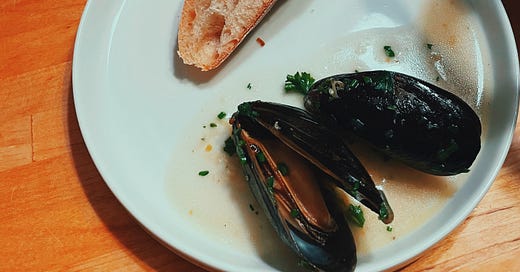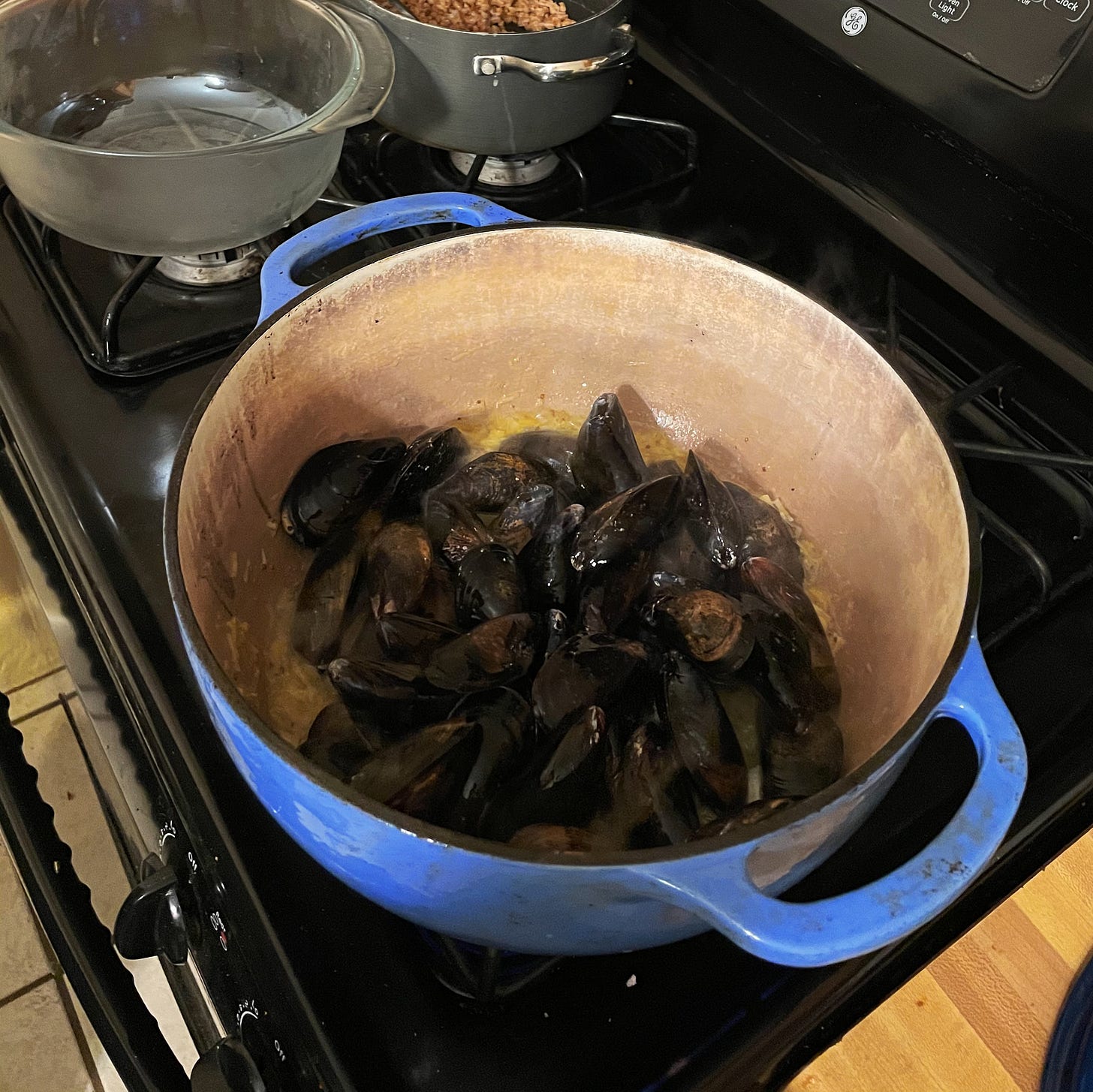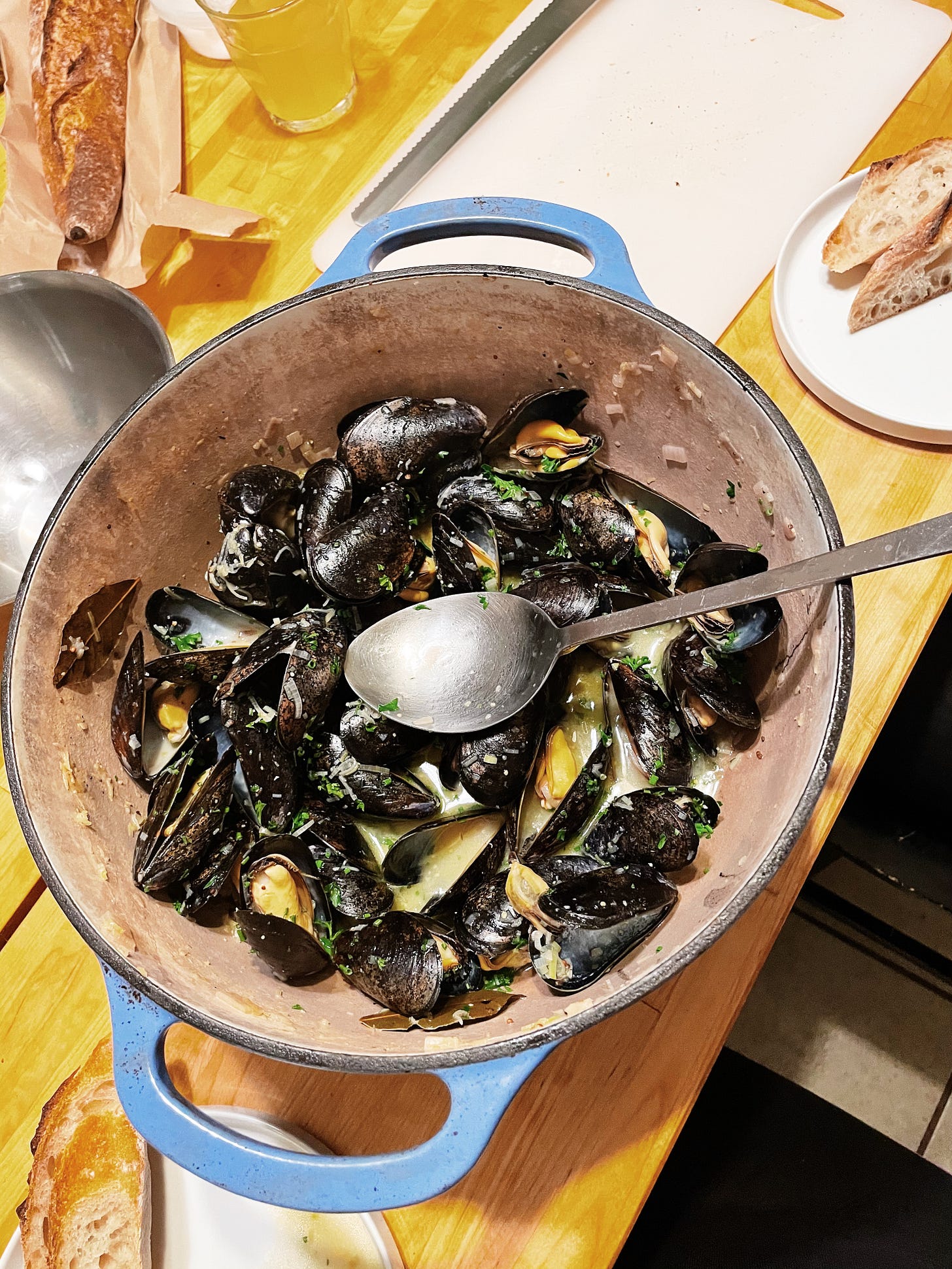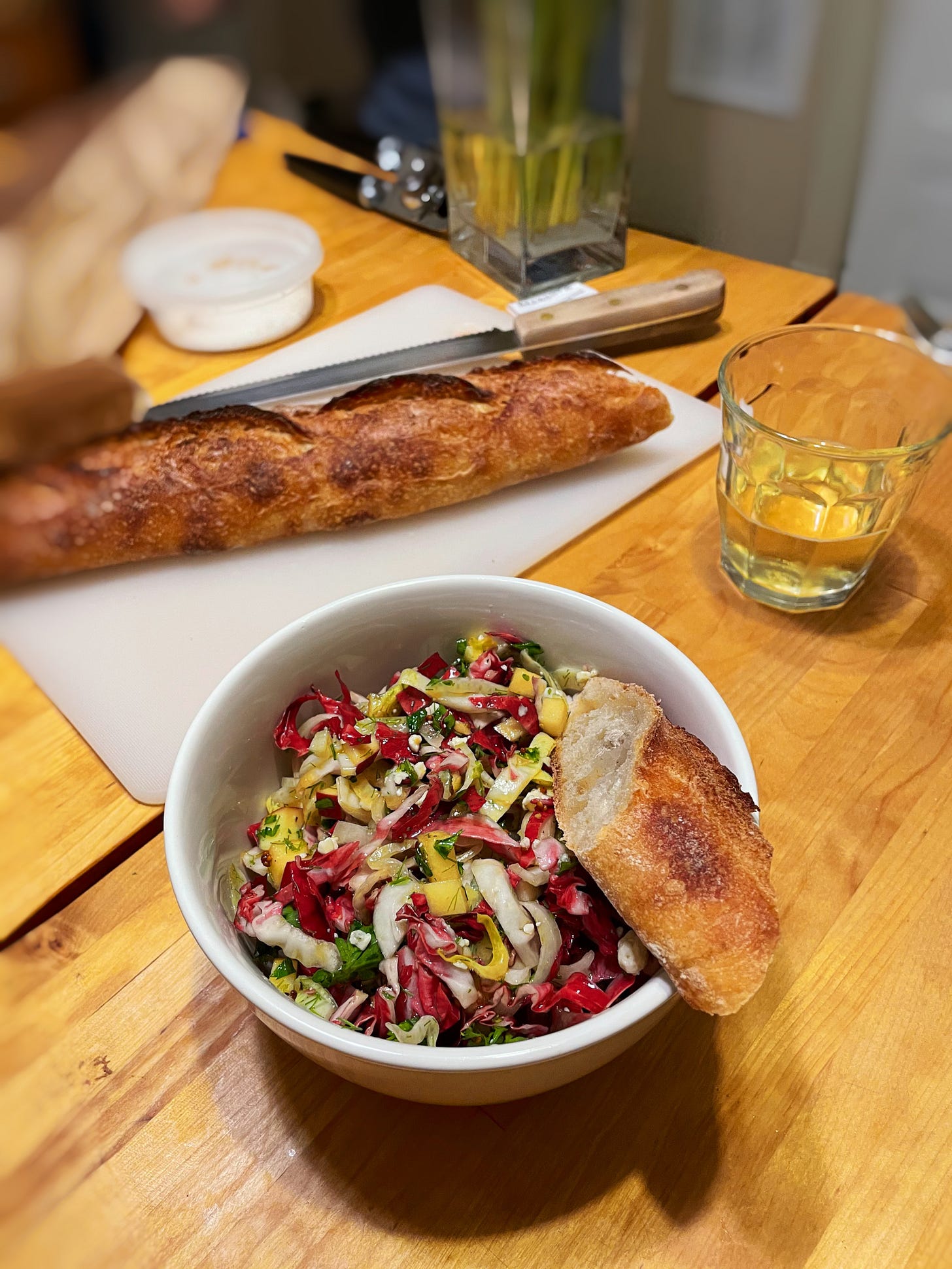I think we can all agree that one of the most arduous tasks in human history is deciding what to eat for dinner. Yes, even in our household. This problem drives Johnathan nuts because usually it’s my fault: “I don't care. Whatever you want. No, not that. Actually not spicy. Actually—” and so on. This is, of course, a trope in broader society too — there are lots of funny memes about girlfriends in particular refusing to pick dinner (we don’t need to go into the gender politics here, but you can probably extrapolate why it’s always women). I would rather hem and haw and get hungrier and crankier than pick the wrong dinner, despite the sun starting to set and Johnathan pinching the bridge of his nose in irritation.
I am difficult about this particular issue, definitely, but more generally I don’t want to make a wrong decision. Like, ever. It’s a problem! I’m told that other people make decisions and know what they want all the time, even without knowing whether it turns out wrong or right for them in the end. Me? I am the “this is fine” dog, sitting in my flaming house until the last possible instant. In the original comic, in fact, the dog melts before he ever leaves. Hmm! My poor, long-suffering therapist is always like, “You know, you’ve made big decisions before. You are changing slowly all the time, even if you can’t see it. And you can make a change in your life again.” Yeah, yeah, I think, but I haven’t made this particular decision, lady. Sylvia Plath put this feeling best:
I saw my life branching out before me like the green fig tree in the story. From the tip of every branch, like a fat purple fig, a wonderful future beckoned and winked. One fig was a husband and a happy home and children, and another fig was a famous poet and another fig was a brilliant professor... I saw myself sitting in the crotch of this fig tree, starving to death, just because I couldn't make up my mind which of the figs I would choose. I wanted each and every one of them, but choosing one meant losing all the rest, and, as I sat there, unable to decide, the figs began to wrinkle and go black, and, one by one, they plopped to the ground at my feet.
This same problem incessantly haunts me: how do I decide what I want? I think we’re all obsessed with this question from time to time, but it truly feels like part of my disposition. It makes me pick close friends that always seem to know the answer in their hearts to any question, and go out and get the goods. I’m inspired by them, but mostly just jealous. Instead I decide not to decide — to reject the commitment to myself I know I have to make — and sit, and wait and wait and wait to be struck by lightning that never hits. Not a cloud in the sky, even. I tend to stagnate in my job and my house and my life, and make myself and everyone around me miserable living in my little swamp, going through the list of all the possible decisions again, rotted figs at my feet.
For dinner, the stakes are lower. So I’ve started to explore deciding on that at least, my dumb fearful animal brain acquiescing that Johnathan is not going to hate me forever for expressing my hunger. I start small: something chewy. Something green. He counters — noodles? Sure, maybe. Or a crusty kind of bread. We go on with this game until we come up with something like a meal. And maybe this is how I unlock the door out of the burning room: taking it slow and building to something new. I have to eat eventually, after all; maybe you should eat, too. —r
Mussels feel incredibly indulgent; a classic “restaurant, but not at home” food. Who doesn’t love the dramatic paper cone full of fries, or clinking around in the little pot with your spoon in a dimly lit place hoping to pull up one more buttery little shell? But mussels don’t have to feel like a splurge. They’re not pricey. In fact, mussels are so inexpensive that they need to be produced in huge quantities to even be profitable. Two pounds of incredibly fresh Prince Edward Island mussels ran us $10 — less than some of the cans of tuna on display at Dirk’s. They cook up in minutes and they couldn’t be easier.
And at a time when people are more aware than ever about the environmental impact of their protein sources, when Epicurious is quitting beef and the President is opening a new battlefield in the culture war by suggesting Americans maybe cool it with the red meat, mussels present a hell of a contrast. Plentiful, completely sustainable, environmentally sound, and not sentient, mussels are one indulgence that doesn’t feel guilty.
I’ve made mussels plenty of times: in wine, in coconut milk, or in a spicy Belgian witbier. I wanted to try something else this time, and I thought of the stash of hard cider aging in our pantry.
One of the things I appreciate most about Rachel is the patience she always has for me, even when I drag her out of bed on a Sunday morning to visit a stranger’s garage and leave with a bucket of presumably illicit, freshly-pressed Michigan apple juice. We buckled it up in our back seat and took it home, while I held my breath as it sloshed every time we drove over a pothole. In our kitchen, we fermented it with a strain of French farmhouse ale yeast. Neither of us had ever made a cider before, and while I certainly learned a lot of things the hard way (use yeast nutrients, cider takes forever to carbonate, etc.), we ended up with a few cases of cider that I’m honestly proud of. Dry, tart, but tasting unmistakably of apples, it drinks like the lovechild of a cider and a saison just the way I hoped it would.
Maybe you’re not sitting on several gallons of bone dry hard cider, or maybe you don’t even like cider. If you want, you can swap in a dry white wine or a Belgian beer. If you’re going to cook them in beer or wine though, don’t be shy, add some garlic; it’s traditional for a reason! I left it out because the salad has plenty of garlic flavor and I was afraid it would blow away the taste of the cider.
Instead of the usual fries, I decided to pair these mussels with some bread and a salad that would provide some crunch to offset their smooth texture. Bitter greens, fennel, and crisp apple are set off by blue cheese and a mustardy vinaigrette that hits just about every note in the book.
One last thing — buy your fresh mussels from a place that sells plenty of them. We went to a fish market specifically, but a busy Asian grocery store that has a lot of seafood turnover would work too. Freshness is everything. —j
ONE-POT MUSSELS WITH CRUNCHY SALAD
serves two
For the salad:
1 small head of radicchio
1 head of Belgian endive
1 bulb of fennel
1 apple (I used a Cosmic Crisp, but I like Granny Smith in salads a lot)
1 small handful of chopped parsley
⅓ cup of crumbled blue cheese
1 clove of garlic
2 tablespoons of sherry vinegar or white wine vinegar
4 tablespoons of olive oil
1 teaspoon of dijon or other spicy mustard
Salt and pepper to taste
Juice of half of a lemon
Get to chopping. Cut the radicchio in half and cut out the hard white core. Thinly slice the radicchio and add it to a salad bowl.
Cut the stalks and the root end off the fennel bulb and discard, keeping a handful of the fennel fronds. Remove the core of the bulb, and slice it thinly, adding both the fronds and the slices to the bowl.
Cut the root end off of the endive, slice it, and add it to the bowl.
Wash and chop the parsley, and add it as well.
Core the apple and chop it into small pieces. Add it to a separate bowl and toss with the juice of half of a lemon to keep it from turning brown. After about five minutes, drain and add the apple to the salad bowl.
Crush a clove of garlic and place it in a small bowl or container. Pour the vinegar over the garlic and allow them to sit together for at least ten or fifteen minutes. Once the vinegar has been infused with some garlic flavor, discard the clove. Add the mustard and olive oil and mix well. Add plenty of salt and pepper, and taste for seasoning, making any adjustments as necessary.
Immediately before serving, add the blue cheese crumbles and dress and toss the salad.
For the mussels:
2 pounds of fresh mussels
1 leek
1 shallot
3 dried bay leaves
8 ounces of dry hard apple cider (must be dry, the dregs of your Strongbow from the 9am kickoff aren’t going to cut it)
3 tablespoons of brandy (optional, but recommended)
3 tablespoons of olive oil
3 tablespoons of butter
1 small handful of chopped parsley
1 small handful of chopped chives
1 teaspoon of Dijon mustard
Salt and pepper to taste
Under cold running water, rinse the mussels well in a colander. If your mussels aren’t super clean after a good rinse, give them a scrub with a stiff brush. Check the flat side of the mussel for any bristly beards, and pull off any that remain with your fingers. Any really stubborn bits can be cleaned off with the blade of a spoon. Discard any mussels with cracked shells or ones that are stuck open (those ones are dead). Once all the mussels are clean, return them to the fridge.
Wash and dry the herbs. Chop them and set them aside. Finely chop the shallot and the white part of the leek, discarding the rest.
In a large, deep pot, heat the olive oil and butter together. Add the dried bay leaves. You’ll know the pot is hot enough when you hear them start to sizzle. When they do, add the shallot and leek with a big pinch of salt. Cook on medium-low heat for at least ten minutes. You’re looking to melt the alliums down without browning them. Take your time with this.
If using, add the brandy and cook until the smell of raw alcohol is completely gone. Add the cider and Dijon mustard, and turn the heat up a bit. You want to cook down this mixture until it’s very concentrated and almost jammy. The mussels will give up plenty of liquid to turn this back into a sauce.
When you’re there, check for seasoning. Don’t be shy with the salt here. Add the mussels to the pot and immediately cover the pot. Give everything a shake, and leave over medium-high heat. After five minutes, give everything a shake again, and take the lid off the pot. If all the mussels are open, you’re good to go! If not, clamp the lid back on the pot and check them every thirty seconds. Err on the side of less cooked than more cooked. Discard any mussels that didn’t open at all. If there’s one on the line that’s sort of open, sort of not, just throw it away.
Sprinkle with the herbs and serve in the pot on the table next to a bowl for empty shells. Enjoy with the salad, a glass of whatever you cooked them in, some crusty bread, some aioli, or some french fries.
When you’re done, take the garbage out. It can’t wait until the morning, trust me.







